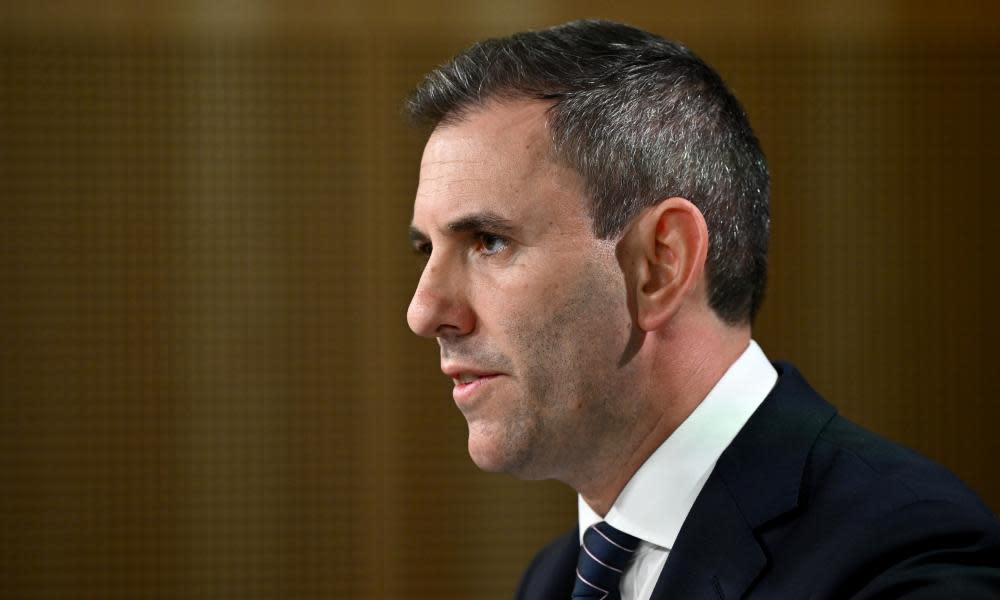Federal Labor prepared to compensate states in effort to drive down energy bills

The federal treasurer, Jim Chalmers, has confirmed the government is prepared to compensate the states for costs incurred as part of a looming regulatory intervention intended to reduce power prices during the first six months of 2023.
Any compensation would be conditional on the states imposing a temporary cap on coal prices, and Chalmers warned the financial support on offer will not be a “blank cheque”. The treasurer told the ABC on Tuesday “there’s not a bottomless pit of commonwealth cash to direct to the task”.
The public signal from the treasurer follows days of assertive public positioning by the Queensland and New South Wales governments, with the premiers signalling they want compensation for costs associated with capping coal prices.
Related: Anthony Albanese says postponing energy market meeting with premiers won’t delay power price relief
The prime minister and the premiers were expected to thrash out some of their differences during a private dinner at Kirribilli House on Tuesday night and then a national cabinet meeting on Wednesday.
But that discussion was delayed after Anthony Albanese confirmed late on Monday he had tested positive for Covid-19. National cabinet is now a virtual discussion rescheduled for Friday, and the conversation between leaders will be preceded by a meeting of energy ministers on Thursday.
Australians are battling escalating cost-of-living pressure with inflation expected to peak at 8%, energy prices forecast to increase by 56% by the end of next year, and the Reserve Bank unveiling a pre-Christmas hike in the official cash rate – the eighth increase in as many months.
With Australians absorbing higher borrowing costs and rising consumer prices, the acting opposition leader, Sussan Ley, said on Tuesday Australians were “expecting immediate and significant” outcomes on power bills from Friday’s meeting.
Albanese used a radio interview early on Tuesday to argue the postponement of national cabinet would not delay the intended power price relief for Australians.
The prime minister confirmed for the first time the proposed regulatory changes were not intended to take effect until next February. That timetable means Australians will not see concrete reductions in their power bills until the first half of 2023.
With agreement on the intervention not yet reached, and with Albanese self-isolating at his Sydney residence, later in the day, Chalmers signalled publicly the government was prepared to have a “reasonable” conversation about the costs of the intervention with the states and other stakeholders.
“We are engaging with the state and territories, the regulators and the various industries in a spirit of good faith in a respectful and constructive way,” the treasurer said. “That means we are prepared to try and smooth the path if that means there is the right outcome for the country and its economy.”
“We’ve got deficits as far as the eye can see … so we need to be really responsible about that, but we also need to be reasonable about it.”
Chalmers also issued an implicit warning about ambit claims when pressed on the ABC about whether the intervention would cost billions.
“I’m obviously not going to back in the sorts of numbers that people have been speculating about in the media,” Chalmers said.
The treasurer said the government was engaging “all the relevant parties” and would do its best to land the right outcome. Chalmers signalled the work was complex and could continue for weeks. He said the objective was to land the intervention before Christmas.
Related: Exploitative gas pricing is causing debt and distress for many Australian households | Gerard Brody
The Albanese government is looking at price cap options to assist industrial users of gas and households battling a surge in their power bills, but it is unclear how quickly the leaders will land an agreement given the unresolved squabble over who carries the costs.
Guardian Australia revealed last week the Albanese government may struggle to provide comprehensive energy price relief unless NSW and Queensland were prepared to cooperate with a plan to temporarily cap the wholesale price of coal.
During a briefing in a federal cabinet meeting last Monday, ministers heard the commonwealth had the regulatory levers to reduce gas prices for industrial users, but there was concern a replica intervention in the coal market might be more complex for Canberra to execute and could open the possibility of legal challenges, given producers will resist.
The NSW government has refuted this, saying it has a legal opinion that suggests Canberra can impose a cap on coal prices.
The Albanese government has shared its own legal advice, which conflicts with the NSW view, with the relevant state governments.
With NSW jockeying ahead of national cabinet, the Queensland premier, Annastacia Palaszczuk, upped the political ante, declaring the Albanese government needed to keep its “hands off our generators”.
Albanese and Chalmers have been signalling since October that Canberra will intervene significantly in the energy market. The catalyst for the intervention was new Treasury forecasts predicting power prices would increase by 56% by the end of next year.
The government has been pursuing price caps for coal and gas, and the intervention will also include making the gas industry code of conduct mandatory.
Albanese said on Tuesday morning every political leader in the country had an interest in landing the regulatory intervention because the alternative was more pain for households and existential pressure on manufacturing businesses.
He said the public positioning in recent days was premiers maximising their own bargaining position rather than a dispute that would derail the process. “You’ve got to draw a distinction between what premiers … say in public in order to promote their own position and what is actually happening, and what’s happening is very constructive dialogue,” the prime minister said.

 Yahoo News
Yahoo News 